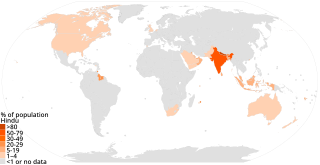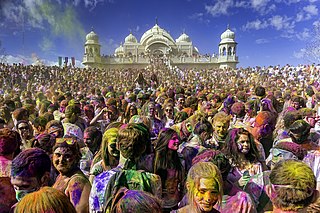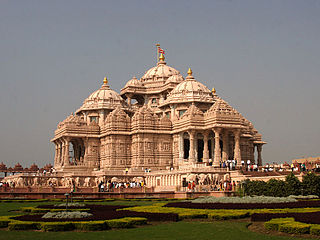Hinduism is an Indian religion or dharma, a religious and universal order by which its followers abide. The word Hindu is an exonym, and while Hinduism has been called the oldest religion in the world, it has also been described as sanātana dharma, a modern usage, based on the belief that its origins lie beyond human history, as revealed in the Hindu texts. Another endonym for Hinduism is Vaidika dharma.

Hindus are people who religiously adhere to Hinduism, also known by its endonym Sanātana Dharma. Historically, the term has also been used as a geographical, cultural, and later religious identifier for people living in the Indian subcontinent.

Hinduism in Southeast Asia had a profound impact on the region's cultural development and its history. As the Indic scripts were introduced from the Indian subcontinent, people of Southeast Asia entered the historical period by producing their earliest inscriptions around the 1st to 5th century CE. Today, Hindus in Southeast Asia are mainly Overseas Indians and Balinese. There are also Javanese and Balamon Cham minority in Cambodia and south central Vietnam who also practice Hinduism.

In the field of comparative religion, many scholars, academics, and religious figures have looked at the relationships between Hinduism and other religions.

Hinduism is a minority religion in South America, which is followed by even less than 1% of the total continent's population. Hinduism is found in several countries, but is strongest in the Indo-Caribbean populations of Guyana and Suriname. There are about 320,000 Hindus in South America, chiefly the descendants of Indian indentured laborers in the Guianas. There are about 185,000 Hindus in Guyana, 120,000 in Suriname, and some others in French Guiana. In Guyana and Suriname, Hindus form the second largest religion and in some regions and districts, Hindus form the majority. Though in recent times, due to influence of Hindu culture the number of Hindus converts have increased in other countries in South America, including Brazil, Argentina, Venezuela and others.

According to the Book of Idols by the medieval Arab scholar Hisham ibn al-Kalbi, Hinduism was present in pre-Islamic Arabia. Ibn Al-Kalbi explains the origins of idol worshipping and the practice of circumambulation as rooted in India and Hinduism.

Hinduism has approximately 1.2 billion adherents worldwide. Hinduism is the third largest religion in the world behind Christianity (31.5%) and Islam (23.3%).

Hinduism is the third largest religion in Australia consisting of more than 684,002 followers, making up 2.7% of the population as of the 2021 census. Hinduism is the fastest growing religion in Australia mostly through immigration. Hinduism is also one of the most youthful religions in Australia, with 34% and 66% of Hindus being under the age of 14 and 34 respectively.

Hinduism is the Fourth-largest religion in Myanmar, being practised by 1.7% of the population of Myanmar. Hinduism is practised by about 890,000 people in Myanmar, and has been influenced by elements of Buddhism, with many Hindu temples in Myanmar housing statues of the Buddha. There are also a large population of Hindus in which the Myanmar Tamils and minority Bengali Hindus having the biggest population share.

Hinduism is the leading single religion of the Indo-Caribbean communities of the West Indies. Hindus are particularly well represented in Guyana, Suriname and Trinidad and Tobago. The Cayman Islands also hosts a sizable Hindu population, with 2.4 percent of the country affiliating with the religion. Smaller groups of Indo-Caribbeans live elsewhere in the Caribbean, especially Puerto Rico, Jamaica, Belize, Barbados, Saint Vincent and the Grenadines, Saint Lucia, and Bahamas.

Hinduism is the fourth-largest religion in the United States, comprising 1% of the population, the same as Buddhism and Islam. The majority of American Hindus are immigrants, mainly from India, Nepal, Sri Lanka, Bangladesh, and the Caribbean, with a minority from Bhutan, Pakistan, Afghanistan, Canada, Africa, Europe, Oceania, and other countries.

Hinduism is the largest and most practised religion in India. According to the 2011 Census of India, 966.3 million people identify as Hindu, representing 79.8% of the country's population. India contains 94% of the global Hindu population. The vast majority of Indian Hindus belong to Shaivite, Vaishnavite and Shakta denominations. India is one of the three countries in the world where Hinduism is the dominant religion.
The official religion of Pakistan is Islam, as enshrined by Article 2 of the Constitution, and is practised by approximately 96.34% of the country's population. The remaining 3.66% practice Hinduism, Christianity, Ahmadiyya Islam, Sikhism and other religions.

Mauritius is the only African Union country where Hinduism is the dominant religion, with about 50% of the population as followers in 2011. Hinduism is the second largest religion in Réunion (6.7%) and Seychelles (5.4%).

Hinduism is a minority religion in Sweden practised by 0.13% of the population or 13,000 people out of a population of 10.5 million. Hinduism is practised mainly by persons of Indian origin and non-resident Indians together. A majority of them are Tamils, Punjabis, Bengalis, Gujaratis, Telugu's and Kannadigas.

Hinduism is a minority religion in Scotland. A significant number of Hindus settled there in the second half of the 20th century. At the time of the 2001 UK Census, 5,600 people identified as Hindu, which equated to 0.1% of the Scottish population and was slightly above the number of Hindus in Wales. In the 2011 Census, the number of Hindus in Scotland almost tripled to over 16,000 adherents. In the 2022 census, this number nearly doubled to just under 30,000 Hindus, representing about 0.6% of the population in Scotland.

Religion in India is characterised by a diversity of religious beliefs and practices. Throughout India's history, religion has been an important part of the country's culture and the Indian subcontinent is the birthplace of four of the world's major religions, namely, Buddhism, Hinduism, Jainism, and Sikhism, which are collectively known as native Indian religions or Dharmic religions and represent approx. 83% of the total population of India.
Myanmar (Burma) is a Buddhist majority country with a significant minority of Christians and other groups residing in the country.

Mauritius is a religiously diverse nation, with Hinduism being the most widely professed faith. According to the 2022 census conducted by Statistics Mauritius, 47.87% of the Mauritian population follows Hinduism, followed by Christianity (32.29%), out of which 24.94% are Catholic, Islam (18.24%) out of which 1.21% are Bangladeshi nationals and other religions (0.86%). 0.63% reported themselves as non-religious and 0.11% did not answer.

Hinduism is the largest religion in South Asia with about 1.2 billion Hindus, forming just under two-thirds of South Asia's population. South Asia has the largest population of Hindus in the world, with about 99% of all global Hindus being from South Asia. Hinduism is the dominant religion in India and Nepal and is the second-largest religion in Bangladesh, Pakistan, Sri Lanka, and Bhutan.















